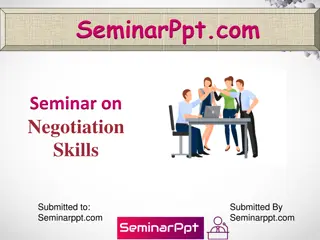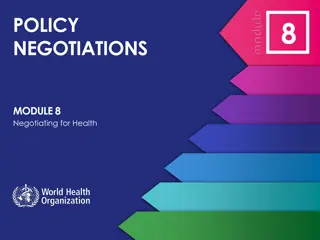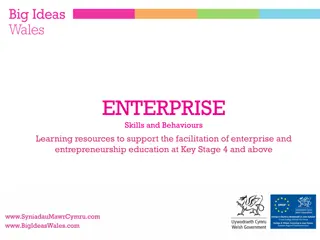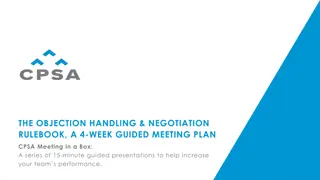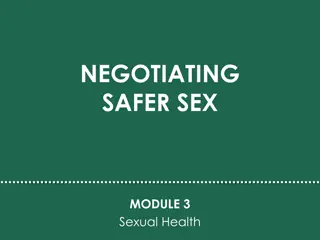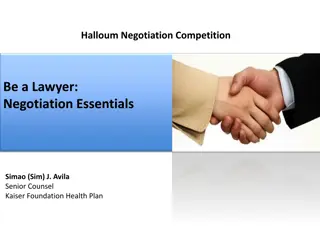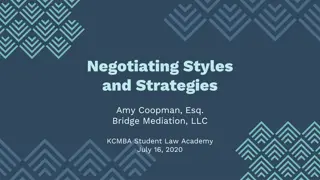Mastering Negotiation Skills: Strategies for Success
Enhance your negotiation prowess with insights from Jennifer E. Woodward, PhD, and learn why negotiation is crucial in various aspects of academia and professional development. Explore polls, definitions, and practical tips on negotiation approaches, key elements, and the art of asking for what you need to achieve win-win outcomes.
Download Presentation

Please find below an Image/Link to download the presentation.
The content on the website is provided AS IS for your information and personal use only. It may not be sold, licensed, or shared on other websites without obtaining consent from the author.If you encounter any issues during the download, it is possible that the publisher has removed the file from their server.
You are allowed to download the files provided on this website for personal or commercial use, subject to the condition that they are used lawfully. All files are the property of their respective owners.
The content on the website is provided AS IS for your information and personal use only. It may not be sold, licensed, or shared on other websites without obtaining consent from the author.
E N D
Presentation Transcript
How to Negotiate for Your Next Opportunity Jennifer E. Woodward, PhD Vice Chancellor for Sponsored Programs and Research Operations Professor of Surgery and Immunology University of Pittsburgh
Poll 1 Getting to Know Each Other What is your current academic rank? a. Graduate Student b. Postdoc c. Other
Poll 2 What area is your research/field of study? a. Medicine b. Health Sciences c. Biological Sciences d. Engineering e. Social Sciences f. Humanities g. Other
What is negotiation? a formal discussion between people who are trying to reach an agreement - Webster s Dictionary Problem-solving Is there a solution that can benefit both parties?
A close up of a person Description generated with very high confidence
Poll 3 Did you negotiate your current position? a. Yes b. No c. Unsure
What do you want to negotiate? Postdoc position Faculty position Industry position Salary Increase in stipend Travel Space Professional development Etc.
Poll 4 What would you like to negotiate? a. Postdoc position b. Faculty position c. Industry position d. Salary e. Increase in stipend f. Travel g. Space to work and/or do research h. Professional development
ASK FOR WHAT YOU NEED! Look for Opportunities Be a Risk Taker If you don t ask, you won t get 9
Approach to Negotiation Win at all cost Compromise at all cost Win - Win
Important Elements in a Negotiation 1 2 3 Attitudes Knowledge Interpersonal Skills http://www.skillsyouneed.com/ips/negotiation.html 11
Interpersonal Skills Effective verbal communication Listening Reducing misunderstanding Rapport building Problem solving Decision making Assertiveness (with caution) Dealing with difficult situations 12
Prepare for the Negotiation - 1 Negotiation should be as collaborative as possible What is your intention? Consider the timing Situation of the other party Do not negotiate prematurely or put off the negotiation Do not wait until you are frustrated or angry Do your homework What you don t know can hurt you Your mentor/boss will have done his/her homework Be prepared! Know your worth 13
Prepare for the Negotiation - 2 Trust is important Be creative think of different ways to get what you want Find ways to satisfy interests/Don t get fixed on position Go with best case scenario in mind - Think positive and aim high. Include nice-to-haves Know Your BATNA (Best Alternative to a Negotiated Agreement) Turn lemons into lemonade - Anticipate what might happen when you ask potential objections and your responses Be aware of your negotiating style and the other party s negotiating style 14
Things To Do during the Negotiation - 1 Communicate what you want Choose your words carefully in a nonthreatening tone Tailor the discussion - Why does it makes sense to the organization or to the person you are negotiating with? Make it organization-focused - What is your value? Take credit for your accomplishments Ask the other party questions, so that you know his/her point of view find a shared vision and common ground
Things To Do during the Negotiation - 2 Keep your eye on the prize - set your sights high and focus on the target (your goal) Be open and flexible, but not a pushover Don t tell your bottom line unless you are ready to walk away Don t walk away until you mean it Listen, use silence, and use body language to your advantage Get it in writing!
Things Not to Do during the Negotiation - 1 Negotiate via email or telephone Listen to the voice in your head / fear rejection Let your emotions take over Become unethical
Things Not to Do during the Negotiation - 2 Personalize the situation Resort to fairness language Apologize for asking Rush the process
Note, Notepad, Pad, Paper, Remember No does not mean NO! It can mean no, maybe, or later. If the answer is No , ask what you can do to move to the next level. No personal rejection or information to work with?
Let us never negotiate out of fear. But let us never fear to negotiate. John F. Kennedy
Sources - 1 Helm, Pat and Susan K. Golant. Hardball for Women: Winning at the Game of Business. New York: Plume, 1993. Minnell, Phyllis. How to Say It for Women. New York: Prentice Hall Press, 2001. Pinkley, Robin L. and Gregory B. Northcraft. Get Paid What You're Worth: The Expert Negotiators Guide to Salary and Compensation. New York: St. Martin s Press, 2000. Stone, Douglas, Bruce Pallon, Sheila Heen, and Roger Fisher. Difficult Conversations: How to Discuss What Matters Most. New York: Penguin, 2000.
Sources - 2 Babcock, Linda and Sara Laschever. Women Don t Ask: Negotiation and the Gender Divide. Princeton: Princeton University Press, 2003. Babcock, Linda and Sara Laschever. Ask For It: How Women Can Use the Power of Negotiation to Get What They Really Want. New York: Bantam Dell, 2008. Dawson, Roger. Secrets of Power Negotiating. Pompton Plains: Career Press, 2000. Evans, Gail. Play Like A Man Win Like A Woman. New York: Broadway Books, 2000. Fisher, Roger and William Ury. Getting to Yes: Negotiating Agreement Without Giving In. New York: Penguin Books, 1991.
Exercises 1. Cases 2. What is my value? 3. The Ask What should I think about?






